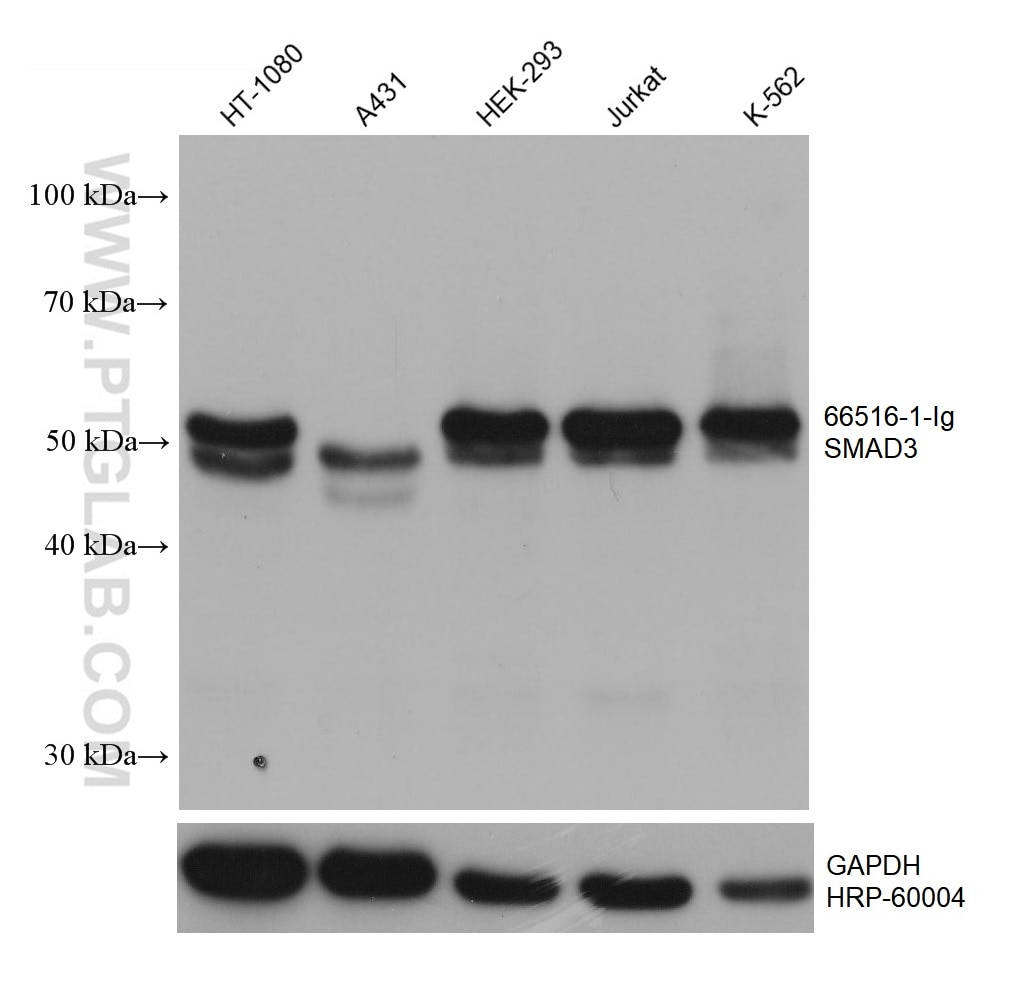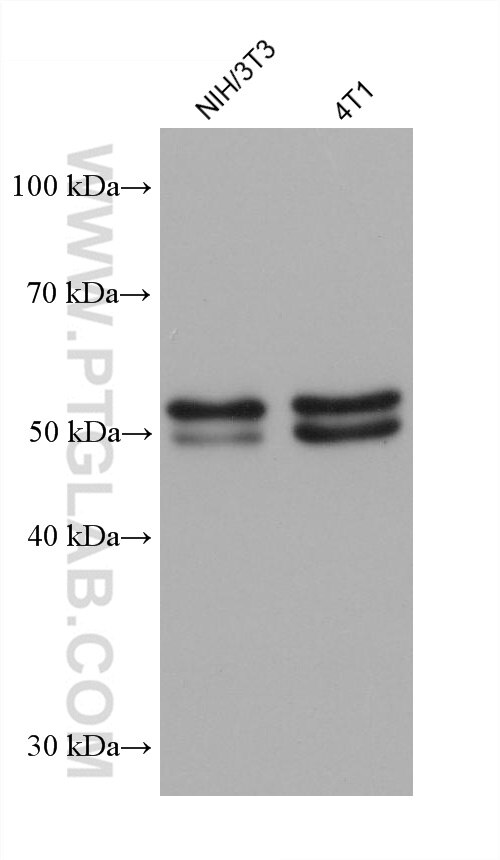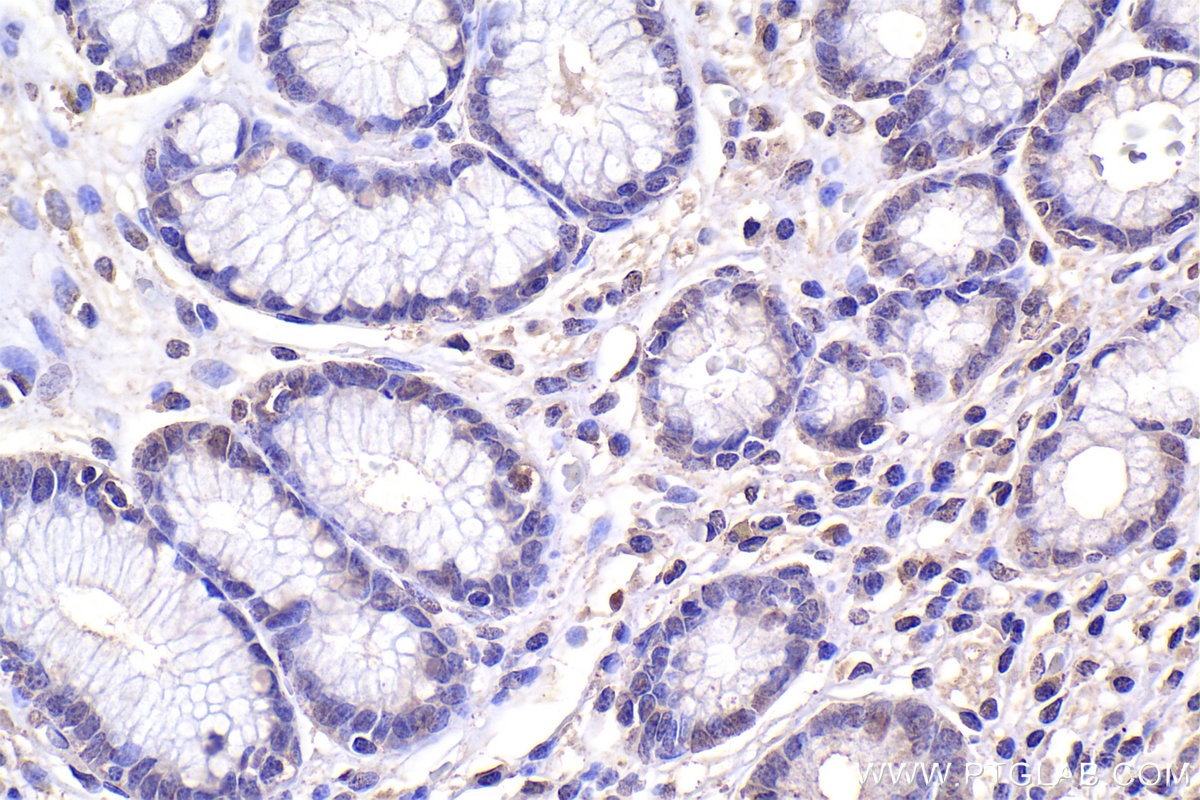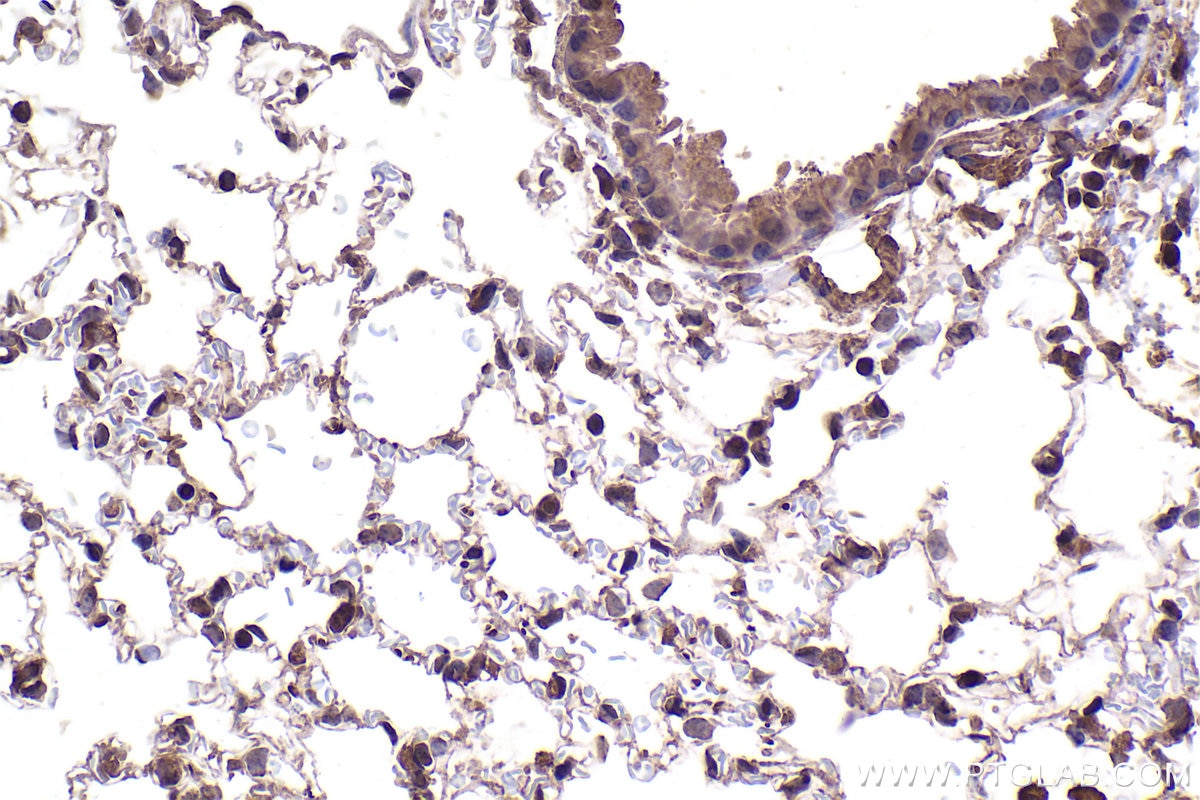SMAD3 Monoklonaler Antikörper
SMAD3 Monoklonal Antikörper für WB, IHC, ELISA
Wirt / Isotyp
Maus / IgG1
Getestete Reaktivität
human, Maus und mehr (1)
Anwendung
WB, IHC, IF, IP, CoIP, ChIP, ELISA
Konjugation
Unkonjugiert
CloneNo.
1F10B2
Kat-Nr. : 66516-1-Ig
Synonyme
Geprüfte Anwendungen
| Erfolgreiche Detektion in WB | HT-1080.Zellen, 4T1-Zellen, A431-Zellen, HEK-293-Zellen, Jurkat-Zellen, K-562-Zellen, NIH/3T3-Zellen |
| Erfolgreiche Detektion in IHC | humanes Magenkrebsgewebe, Mauslungengewebe Hinweis: Antigendemaskierung mit TE-Puffer pH 9,0 empfohlen. (*) Wahlweise kann die Antigendemaskierung auch mit Citratpuffer pH 6,0 erfolgen. |
Empfohlene Verdünnung
| Anwendung | Verdünnung |
|---|---|
| Western Blot (WB) | WB : 1:2000-1:12000 |
| Immunhistochemie (IHC) | IHC : 1:500-1:2000 |
| It is recommended that this reagent should be titrated in each testing system to obtain optimal results. | |
| Sample-dependent, check data in validation data gallery | |
Veröffentlichte Anwendungen
| WB | See 113 publications below |
| IHC | See 2 publications below |
| IF | See 7 publications below |
| IP | See 1 publications below |
| CoIP | See 4 publications below |
| ChIP | See 1 publications below |
Produktinformation
66516-1-Ig bindet in WB, IHC, IF, IP, CoIP, ChIP, ELISA SMAD3 und zeigt Reaktivität mit human, Maus
| Getestete Reaktivität | human, Maus |
| In Publikationen genannte Reaktivität | human, Kaninchen, Maus |
| Wirt / Isotyp | Maus / IgG1 |
| Klonalität | Monoklonal |
| Typ | Antikörper |
| Immunogen | Peptid |
| Vollständiger Name | SMAD family member 3 |
| Berechnetes Molekulargewicht | 48 kDa |
| Beobachtetes Molekulargewicht | 55-60 kDa |
| GenBank-Zugangsnummer | NM_005902 |
| Gene symbol | SMAD3 |
| Gene ID (NCBI) | 4088 |
| Konjugation | Unkonjugiert |
| Form | Liquid |
| Reinigungsmethode | Protein-G-Reinigung |
| Lagerungspuffer | PBS with 0.02% sodium azide and 50% glycerol |
| Lagerungsbedingungen | Bei -20°C lagern. Nach dem Versand ein Jahr lang stabil Aliquotieren ist bei -20oC Lagerung nicht notwendig. 20ul Größen enthalten 0,1% BSA. |
Hintergrundinformationen
SMAD3, also named as hMAD 3 or Mad3, is a 425 amino acid protein, which contains one MH1 domain and one MH2 domain. SMAD3 localizes in the nucleus and cytoplasm. SMAD3 plays an essential role in development and maintenance of self-tolerance and is a critical mediator of the TGFB signaling pathway. SMAD3 is involved in TGFB dependent regulation of steroidogenesis and in T-cell response to TGFB.
Protokolle
| PRODUKTSPEZIFISCHE PROTOKOLLE | |
|---|---|
| WB protocol for SMAD3 antibody 66516-1-Ig | Protokoll herunterladen |
| IHC protocol for SMAD3 antibody 66516-1-Ig | Protokoll herunterladenl |
| STANDARD-PROTOKOLLE | |
|---|---|
| Klicken Sie hier, um unsere Standardprotokolle anzuzeigen |
Publikationen
| Species | Application | Title |
|---|---|---|
J Exp Clin Cancer Res ACTN1 promotes HNSCC tumorigenesis and cisplatin resistance by enhancing MYH9-dependent degradation of GSK-3β and integrin β1-mediated phosphorylation of FAK | ||
Drug Des Devel Ther Keloid Patient Plasma-Derived Exosomal hsa_circ_0020792 Promotes Normal Skin Fibroblasts Proliferation, Migration, and Fibrogenesis via Modulating miR-193a-5p and Activating TGF-β1/Smad2/3 Signaling | ||
Cancer Lett Direct contact between tumor cells and platelets initiates a FAK-dependent F3/TGF-β positive feedback loop that promotes tumor progression and EMT in osteosarcoma | ||
Cell Chem Biol Substrate-dependent interaction of SPOP and RACK1 aggravates cardiac fibrosis following myocardial infarction | ||
Cell Mol Life Sci Macrophage Dectin-1 mediates Ang II renal injury through neutrophil migration and TGF-β1 secretion | ||
Diabetes Overexpressed Poldip2 incurs retinal fibrosis via the TGFβ1/SMAD3 signaling pathway in diabetic retinopathy |
Rezensionen
The reviews below have been submitted by verified Proteintech customers who received an incentive for providing their feedback.
FH Juliette (Verified Customer) (11-25-2024) | Good
|





